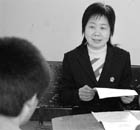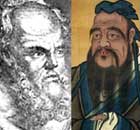Money
Change is brewing in tea trade
By Wang Wen (China Daily)
Updated: 2010-04-06 07:57
 |
Large Medium Small |
The highest grade of Longjing tea (known as "special bright") will be auctioned in Beijing on Thursday for the first time. Longjing village, in Zhejiang province, only produced 10 kg of "special bright" Longjing tea this year.
Some other major Chinese cities have started holding tea auctions, but most tea in China - including virtually all of it in Beijing - is still bought and sold through markets and teashops, even though China produces and exports more tea than any other country in the world.
"Auctions are a more suitable way to trade tea in China and are the most common way to sell the stuff in other major tea-producing countries, such as India and Ceylon," said Han Yi, an official with the Beijing Jiahe Auction House, which will help hold the auction.
Jiahe has held tea auctions in other Chinese cities.
This auction is likely only the start of a trend toward auctioning all kinds of tea in Beijing, according to Han.
The tea will fetch a reasonable price at the auction, she added.
The initial bid will be set at 20,000 yuan per kg, said an official with the China Forestry Exchange surnamed Tian, who is in charge of the auction.
"Special bright" is considered the highest grade of Longjing tea because it is the first picked each year. The 10 kg up for grabs at the auction is the entire "special bright" yield for 2010, said Tian.
The amount of "special bright" Longjing tea produced each year varies significantly with the weather and Zhejiang was hit by a lot of snow and rain in early March, making this year's harvest dramatically smaller than usual, said Tian.
The prices of other grades of Longjing tea have also increased in Beijing this year because of lower yields.
"Business is slow this year because the price increased from 800 yuan per kg to more than 1,000 yuan per kg," said Wu Guipeng, manager of Taihuashan Tea Co in south Beijing's Maliandao area, which is home to several special shopping arcades and many small independent shops dedicated to tea products.
Wu said his revenue from Longjing tea last year was more than 30,000 yuan, but he did not expect the same business this year.







